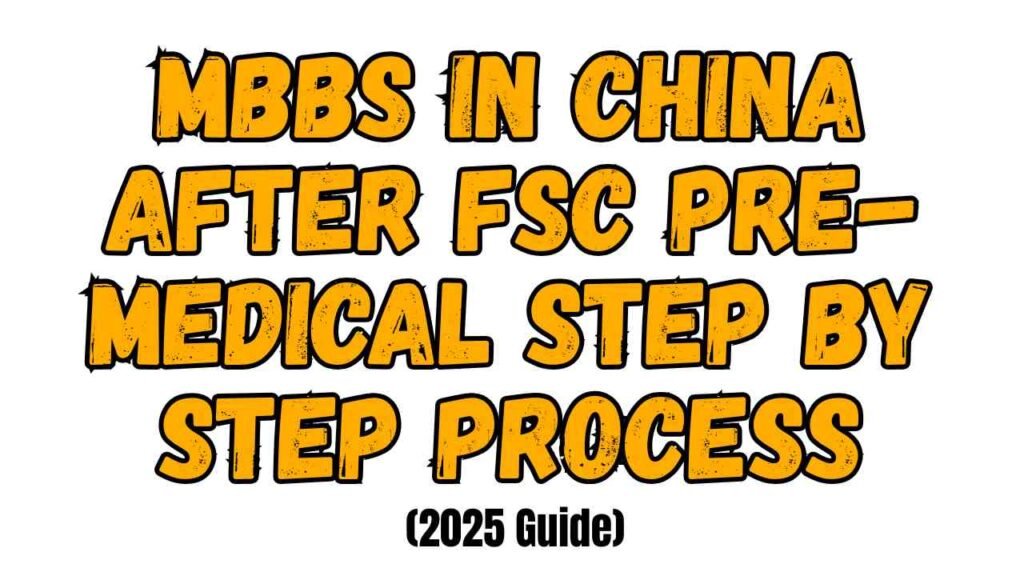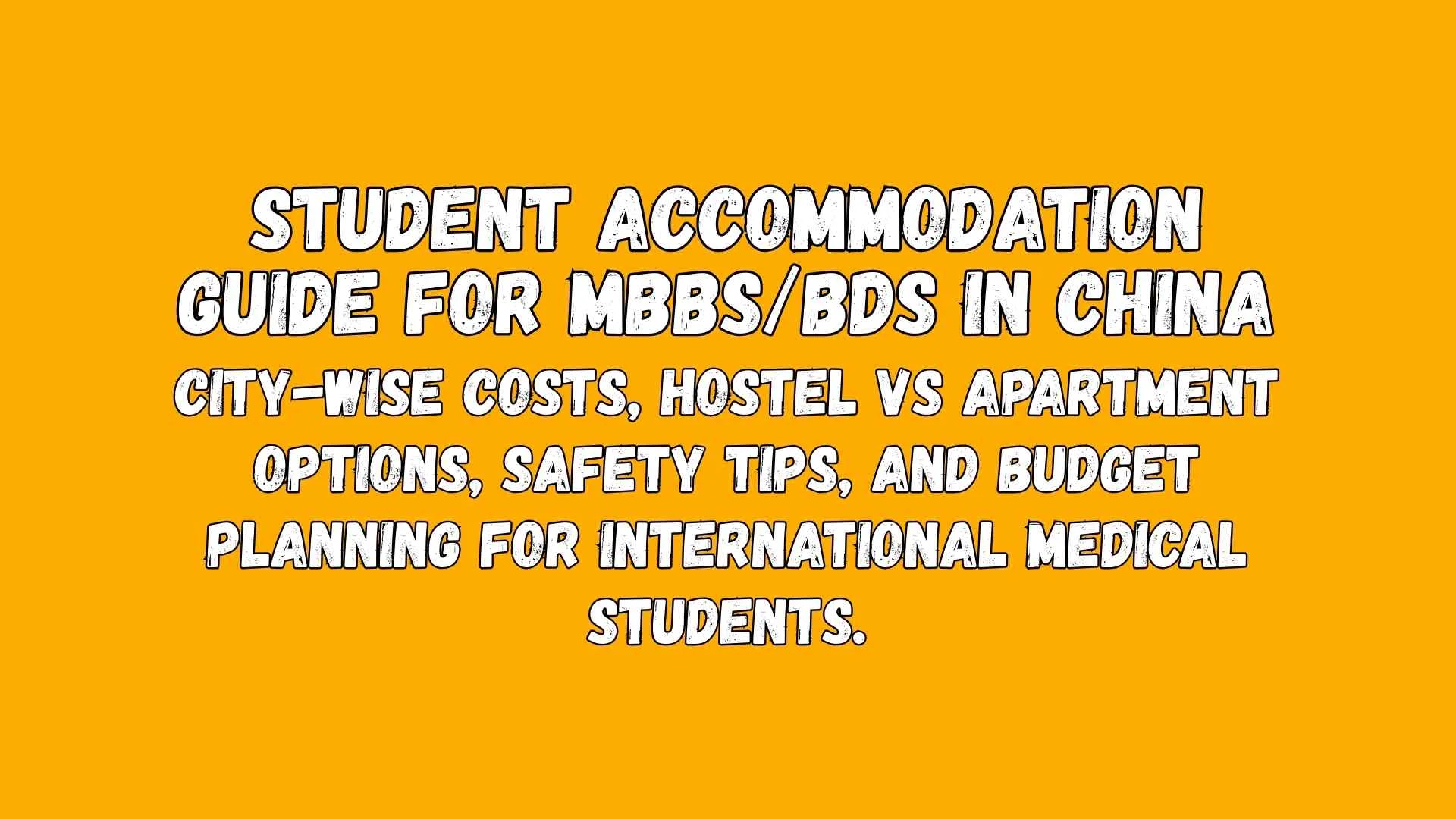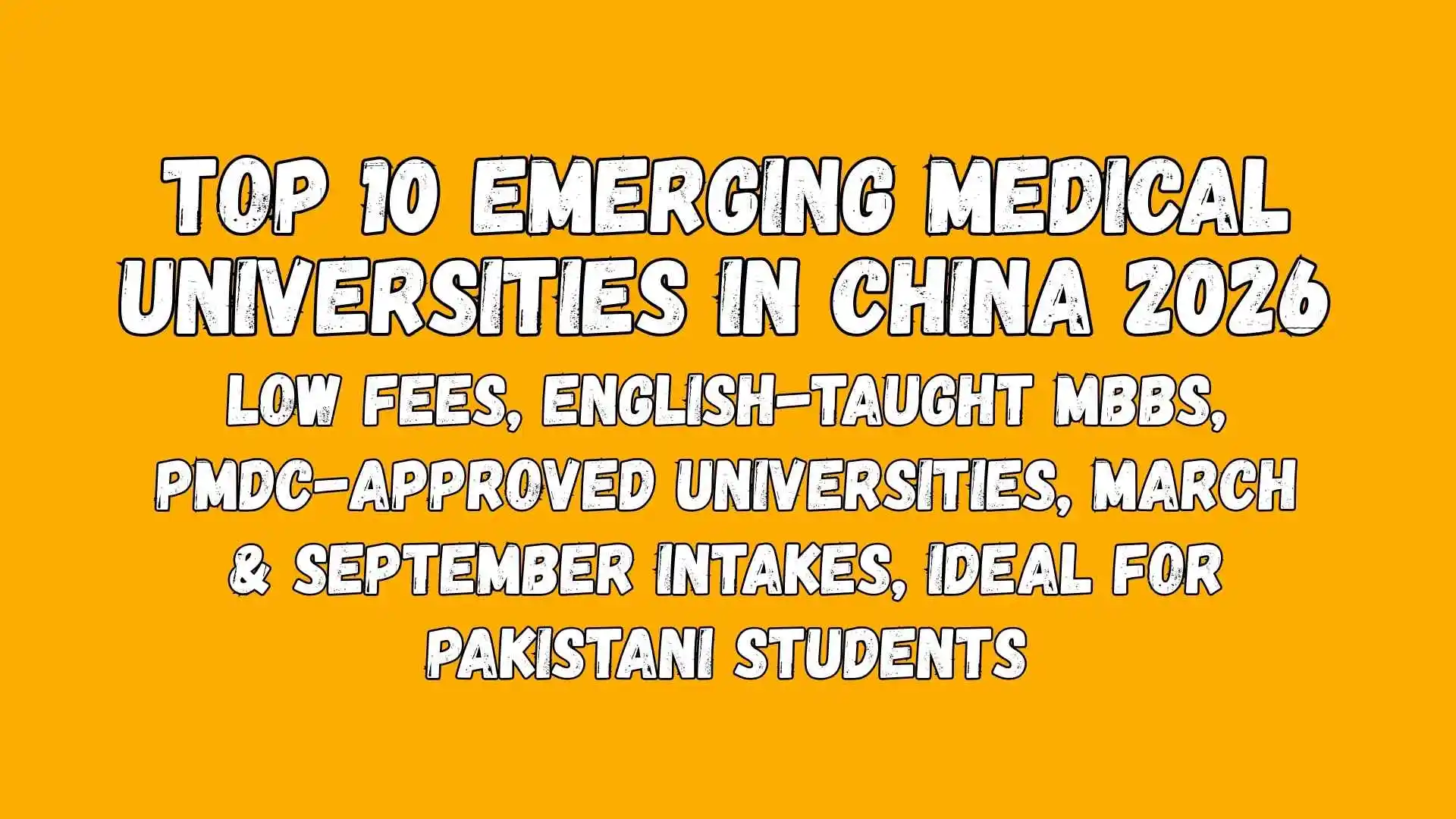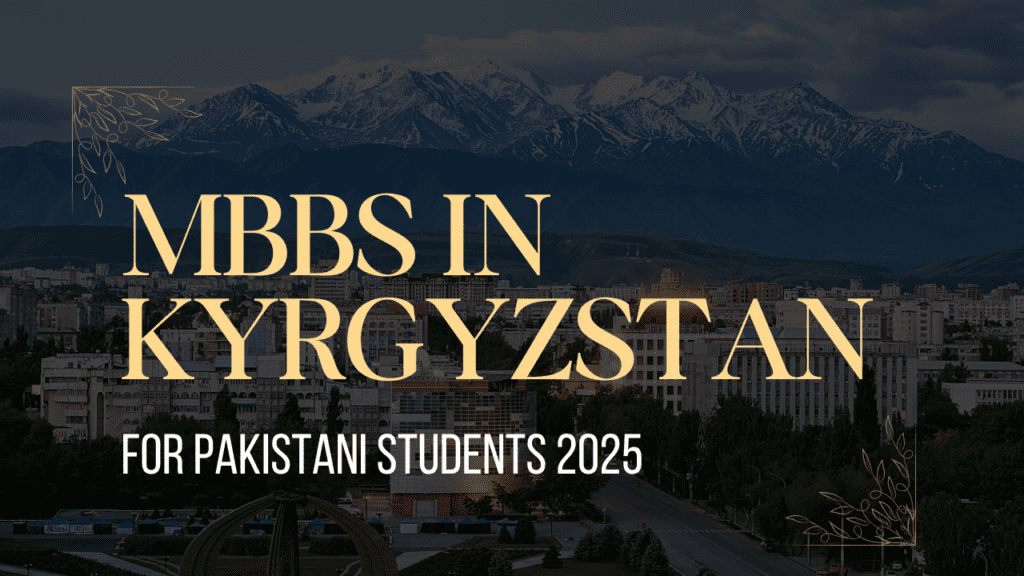MBBS in China After FSc Pre-Medical Step by Step Process
Home > MBBS in China After FSc Pre-Medical Step by Step Process

Many students in Pakistan finish FSc Pre-Medical but cannot get admission into medical colleges because of high competition and limited seats. Private medical colleges charge very high fees, making it difficult for most families. MBBS in China after FSc is a great option for such students.
China offers a chance to study medicine at affordable fees and in universities recognized by PMDC, so you can come back to Pakistan and work as a doctor after graduation. Most programs are taught in English, so you don’t have to know Chinese to start your studies. The universities have modern labs, hospitals, and experienced teachers to give you quality medical training.
In this step-by-step 2025 guide, you will learn how to choose the right university, apply, get your visa, and start your medical career.
Eligibility Criteria After FSc Pre-Medical
If you want to apply for MBBS in China after FSc Pre-Medical, there are some basic rules you must follow. These rules make sure you can get admission easily and your MBBS degree will be accepted in Pakistan.
1. FSc Marks
You must have done FSc Pre-Medical with Biology, Chemistry, and Physics.
Minimum marks: 60%
Better universities may ask for 65% or more.
The higher your marks, the more choices you will have.
2. Age Limit
Your age should be between 17 and 25 years at the time you apply.
3. MDCAT Requirement
For admission in China, many universities don’t ask for MDCAT.
For working in Pakistan, PMDC says you must pass MDCAT in the same year you take admission abroad.
4. English Language
Classes are in English.
You don’t need IELTS/TOEFL.
You should understand basic English to follow lectures.
5. Medical Fitness
You must be healthy and free from serious diseases.
A medical check-up report is required.
6. Valid Passport
Your passport should be valid for at least 1 year when you apply.
7. Clean Record
A police clearance certificate is needed to show you have no criminal record.
8. Required Documents Ready
Scanned copies of FSc result, passport, and other papers must be prepared.
Step 1 – Decide Why You’re Choosing MBBS in China
Before you even apply, you must be clear about your goal. Think about your future — Will you work in Pakistan, Gulf countries, UK, or USA after MBBS?
Understand the benefits of MBBS in China:
- Lower tuition than Pakistani private colleges.
- Internationally recognized degrees (WHO, PMDC, ECFMG).
- English-medium programs available.
- Talk to seniors who are already studying there.
Avoid confusion later — Some students waste money by applying without research and then change countries.
Example: A student from Lahore wanted to work in Pakistan after MBBS, so he chose a PMDC-approved Chinese university. This saved him from recognition problems later.
Step 2 – Research & Shortlist Universities
Don’t just apply to the first university you hear about.
- Check recognition: PMDC list & MOE list for English-medium MBBS.
- Compare tuition fees: 18,000–50,000 RMB/year (~PKR 700,000–2,000,000).
- Look at location: Big cities are expensive; smaller cities are cheaper.
- Check facilities: Hostel, halal food, labs, libraries.
- Ask about language: Fully English taught? Clinical years with translation?
Step 3 – Prepare Your Documents
You’ll need attested and complete documents before applying. Missing papers delay admission.
Essential Documents:
- Passport (valid for at least 1 year)
- FSc certificate & marksheets (IBCC & MOFA attested)
- Matric certificate (attested)
- MDCAT result card (if required)
- Passport-size photos (12–18, white background)
- Medical certificate
- Police clearance certificate
- University application form
- Bank statement (sometimes required)
Step 4 – Apply to the University
You have two options:
- Direct Application: University website, form, documents, application fee.
- Through a Consultant: Like Soft Consultants, who help choose the right university, check PMDC approval, and handle paperwork.
Step 5 – Wait for Your Conditional Admission Letter
The university will check your documents. If you qualify, they’ll issue a conditional offer letter (accepted after fee payment).
Example: A student from Karachi got her letter in 7 days after applying; another from Faisalabad waited 3 weeks because his documents were incomplete.
Step 6 – Pay Initial Fees
Most universities ask for a registration fee or part of first-year tuition before final admission. Payment is usually via bank transfer.
Step 7 – Receive JW202 or JW201 Form
This is the official Chinese government visa form for international students. Without it, you can’t apply for a student visa. The university will send it by DHL or FedEx.
Step 8 – Apply for Chinese Student Visa
Go to the Chinese Embassy in Islamabad or Chinese Consulate in Karachi.
Submit:
- Admission letter
- JW202/JW201 form
- Passport
- Visa application form (V201)
- Medical certificate
Visa Types:
- X1 Visa: For studies longer than 6 months (MBBS students need this).
- X2 Visa: For studies less than 6 months.
Step 9 – Arrange Travel
Book your flight to the city near your university. Airlines like PIA, China Southern, and Air China are common.
Pack essentials:
- Warm clothes (if going to northern China)
- Medicines from Pakistan
- Copies of all documents

Benefits of Doing MBBS in China After FSc
Low Tuition Fees
Studying MBBS in China costs 21,000 – 36,000 RMB/year for Pakistani students, much cheaper than Western countries.
No Extra Charges
Tuition fees include lab, student activity, and welfare charges—no hidden costs.
Fully Funded Scholarships
Scholarships cover tuition, living expenses, and give a monthly stipend to talented Pakistani students.
Higher Chances of Acceptance
Simple eligibility requirements—about 95% of Pakistani applicants get accepted, even with 60–70% marks.
Recognized MBBS Degrees
Over 59 universities approved by WHO & PMDC—work in Pakistan, USA, UK, Russia, Turkey & more.
Common Mistakes & How to Avoid Them
1. Choosing a University Not Approved by PMDC
Problem: Can't work as a doctor in Pakistan after graduation.
2. Ignoring the Medium of Instruction
Problem: MBBS taught in Chinese language makes learning difficult.
3. Skipping MDCAT Before Going to China
Problem: PMDC won't grant license without MDCAT.
4. Looking Only at Tuition Fees
Problem: Forgetting hostel, food, visa & insurance costs.
5. Trusting the Wrong Agent
Problem: Risk of losing money or getting false info.
6. Sending Wrong or Incomplete Documents
Problem: Delays or rejection of admission.
7. Not Understanding Visa Rules
Problem: Visa rejection due to missing requirements.
Frequently Asked Questions
Apply Now
Table of Contents
-
17 Jan 2026 UncategorizedStudent Life in China for Pakistani Students 2026 Guide
-
15 Jan 2026 UncategorizedTop Masters in Turkey STEM Programs 2026 with Scholarships
-
14 Jan 2026 UncategorizedChinese MBBS Degree Recognition in Europe, Gulf & Middle East (2026)
-
13 Jan 2026 UncategorizedStudent Accommodation in China for MBBS/BDS: Costs, Cities & Tips 2026
-
12 Jan 2026 UncategorizedTop Turkish Universities Accepting Students Without IELTS/TOEFL (2026)
-
09 Jan 2026 UncategorizedEmerging Medical Universities in China 2026 – Low Fee MBBS for Pakistanis
-
08 Jan 2026 UncategorizedMBBS in China March 2026 Intake | Complete Guide for Pakistani Students
-
07 Jan 2026 UncategorizedGap Year Strategy 2026 for Pakistani Students | Study Abroad Guide
-
06 Jan 2026 UncategorizedMBBS & BDS in Kyrgyzstan 2026: Eligibility, Fees & Admission Guide for Pakistanis
-
05 Jan 2026 UncategorizedBDS Abroad with Low Marks or Gap Years | Soft Consultants












